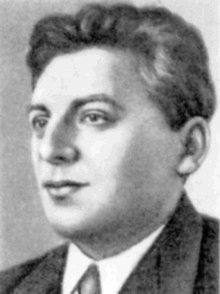Izrail Agol
Izrail Iossofovich Agol (November 20, 1891 – March 8, 1937) was a Soviet geneticist and philosopher. He was a member of the USSR Academy of Science, worked briefly in the United States of America and took an interest in radiation induced mutagenesis. As a Marxist philosopher, he also studied vitalist and mechanist views in biology and their relation to Marxism. He was killed in the aftermath of Trofim Lysenko's rise in the Stalin regime.

Agol was born in Babruysk (Belarus) in a poor Jewish family. He was drafted into World War I and was part of a local self-defence group against a pogrom in which he a friend and his first love were shot dead. Agol took part in the October Revolution after which he was involved in the local Bolshevik Party Committee. He graduated from Moscow University in 1923. He conducted research under A.S. Serebrovsky. He worked in the communist party and was involved in editing various newspapers and publications. In 1920 he lived in the Kremlin where his wife worked in Lenin's office. He joined the Institute of Red Professors in 1925 and received a Rockefeller scholarship to study genetics under Hermann Joseph Muller at the University of Texas from 1930 to 1932 along with Solomon Levit. They returned to the Soviet Union and found themselves in opposition to Trofim Lysenko. He was arrested on May 27, 1936 along with Nikolai Vavilov. He was shot as a Trotskyite on March 10, 1937. The Supreme Court of the USSR rehabilitated him on May 25, 1957. A son, Vadim, became a molecular biologist and virologist.[1][2]
Agol was a staunch Marxist and wrote a book on biology, vitalism and mechanistic views and their relation to Marxism [Витализм, механистический материализм и марксизм (1929)]. He also published on his experiments in mutation induction through X-rays in Drosophila. An autobiographical manuscript was published posthumously by his son.[1]
References
- Gaissinovitch, A. E. (1980). "The origins of Soviet genetics and the struggle with Lamarckism, 1922?1929". Journal of the History of Biology. 13 (1): 1–51. doi:10.1007/BF00125353. PMID 11610731.
- Gershenson, S. M. (1990). "Difficult Years in Soviet Genetics". The Quarterly Review of Biology. 65 (4): 447–456. doi:10.1086/416951. PMID 2082406.